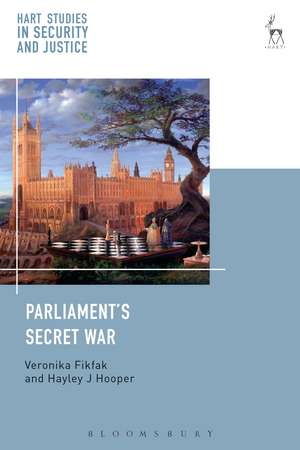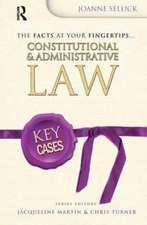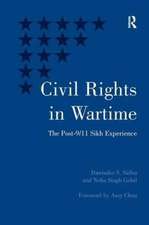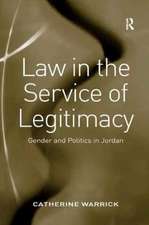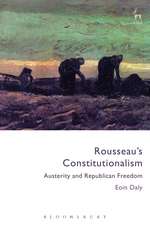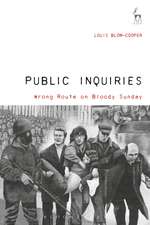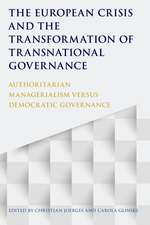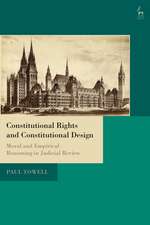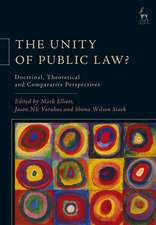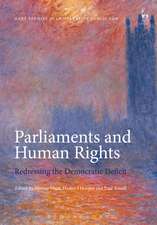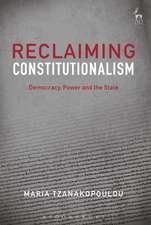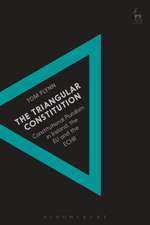Parliament’s Secret War: Hart Studies in Security and Justice
Autor Veronika Fikfak, Hayley J Hooperen Limba Engleză Paperback – 24 iun 2020
| Toate formatele și edițiile | Preț | Express |
|---|---|---|
| Paperback (1) | 271.14 lei 6-8 săpt. | |
| Bloomsbury Publishing – 24 iun 2020 | 271.14 lei 6-8 săpt. | |
| Hardback (1) | 570.83 lei 6-8 săpt. | |
| Bloomsbury Publishing – 21 feb 2018 | 570.83 lei 6-8 săpt. |
Preț: 271.14 lei
Preț vechi: 348.38 lei
-22% Nou
Puncte Express: 407
Preț estimativ în valută:
51.88€ • 56.53$ • 43.72£
51.88€ • 56.53$ • 43.72£
Carte tipărită la comandă
Livrare economică 23 aprilie-07 mai
Preluare comenzi: 021 569.72.76
Specificații
ISBN-13: 9781509939824
ISBN-10: 1509939822
Pagini: 272
Dimensiuni: 156 x 234 mm
Greutate: 0.39 kg
Editura: Bloomsbury Publishing
Colecția Hart Publishing
Seria Hart Studies in Security and Justice
Locul publicării:London, United Kingdom
ISBN-10: 1509939822
Pagini: 272
Dimensiuni: 156 x 234 mm
Greutate: 0.39 kg
Editura: Bloomsbury Publishing
Colecția Hart Publishing
Seria Hart Studies in Security and Justice
Locul publicării:London, United Kingdom
Caracteristici
Coinciding with the publication of the long awaited Chilcot Inquiry, it offers a much needed critical assessment of Parliament's war prerogative.
Notă biografică
Veronika Fikfak is Fellow and Lecturer in Law at Homerton College, University of Cambridge.Hayley J Hooper is Fellow in Law at Christ Church, University of Oxford.
Cuprins
1. Parliament's Secret War 1Veronika Fikfak and Hayley J HooperA. The Role of the House of Commons in War Powers Decisions: An Historical View B. From Discretion to Democratisation C. Roadmap of the Book D. Methodology: The Political Constitution and Evidence-Based Public Law 2. A Legal War? Veronika FikfakA. Use of Force as an International Legal Question B. Bringing the War Question Home C. Use of Force as a Domestic Question D. The Implications of Linking International Legality to Parliament's Constitutional Role on War E. Shining a Light on the Subjugation of Politics 3. The Convention as a Battlefield Veronika FikfakA. The Role of Conventions in the UK Constitutional Sphere B. The Timing of the Engagement C. Parliament's Hollow Veto Power D. Emergencies, Drones and Special Forces E. Unrealised Accountability 4. The Deployment of Secrecy Hayley J HooperA. Groupthink and Information Asymmetry B. Complete Asymmetry: Refusing Debates and Making Secret Pre-commitments C. Partial Asymmetry: Selective Disclosures D. Reforming the Intelligence Machinery: An Incomplete SolutionE. Towards a New Nomenclature of Secrecy 5. Re-arming Parliament: Fostering Politics Veronika Fikfak and Hayley J HooperA. Moving Beyond the Standard Solutions B. Creating Space for Politics and Equipping Parliament for Deliberation C. Voting Within a Culture of Justification 6. Closed Intelligence Sessions Hayley J HooperA. Chilcot's Proposal for Parliamentary Scrutiny of Intelligence Material B. The Alternative: Closed Intelligence Sessions of the Whole House of Commons C. Justifications for Initiating a Closed Intelligence Session D. Controlling Abuse of Closed Intelligence SessionsE. Security Considerations F. Inclusive Secrecy, Transparency, Participation and Accountability
Recenzii
The literature on parliamentary control of military action has blossomed since the predictably ill-fated war in Iraq. Parliament's Secret War represents its clear high point. It is exceptionally well researched, intellectually well rounded, and responds fully to the challenge it sets itself, showing why the war powers convention falls short and making a compelling case for reforms which might remedy some of its current failings.
By any measure, this is an excellent book. It is innovative, timely, thorough, and challenges orthodoxy in a sustained, compelling, and methodical way. Bringing together research from both domestic and international legal scholarship gives the book depth and nuance.
The book is a timely, comprehensive, and necessary study of 'how Britain constitutionally decides to go to war', or, 'how the House of Commons is and should be involved in the decision to send British troops into harm's way'... The book's core message - that we must strive to keep in good health the political constitution, that we must continue to expose and scrutinise those 'hidden power structures' - will resonate not only with those concerned specifically with the issue of domestic accountability arrangements vis-à-vis UK war powers, and the place of the nascent War Powers Convention within these arrangements. The book will be of interest to those keen to understand how the UK's constitutional machinery continues to evolve against the backdrop of pressing issues of contemporary constitutional import, more broadly.
By any measure, this is an excellent book. It is innovative, timely, thorough, and challenges orthodoxy in a sustained, compelling, and methodical way. Bringing together research from both domestic and international legal scholarship gives the book depth and nuance.
The book is a timely, comprehensive, and necessary study of 'how Britain constitutionally decides to go to war', or, 'how the House of Commons is and should be involved in the decision to send British troops into harm's way'... The book's core message - that we must strive to keep in good health the political constitution, that we must continue to expose and scrutinise those 'hidden power structures' - will resonate not only with those concerned specifically with the issue of domestic accountability arrangements vis-à-vis UK war powers, and the place of the nascent War Powers Convention within these arrangements. The book will be of interest to those keen to understand how the UK's constitutional machinery continues to evolve against the backdrop of pressing issues of contemporary constitutional import, more broadly.
